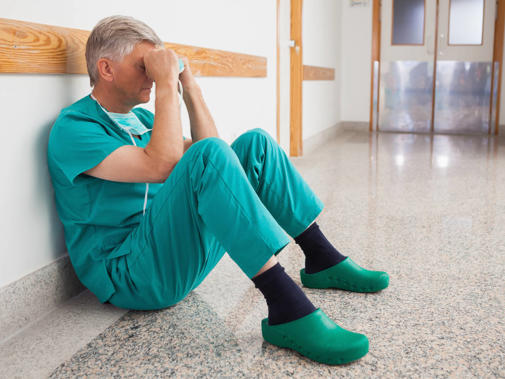The union says the worst of the mental health consequences of the pandemic are still to come – and a comprehensive strategy to support the NHS workforce now and in the future is vital.
In a report published today, the BMA calls on the health service and the governments of the UK to ensure doctors and other healthcare workers have access to the help they need.
It warns that 45 per cent of doctors suffer from depression, anxiety, stress, burnout or other mental health conditions caused or made worse by the COVID-19 crisis, and one in five feel they do not have access to necessary help.
Unease at work
The union says its wellbeing support services and other services have seen an increase in calls from doctors worried about going to work to face unknown situations. Doctors feel they are risking their own lives, and those of their families, owing to a lack of sufficient PPE (personal protective equipment) and that they also feel guilt at leaving their colleagues behind at the end of their shift, the report says.
Doctors have also reported feeling uncertainty at a time when clinical guidelines, working arrangements and job roles have been changing.
The BMA report sets out 10 recommendations, which it says should be considered as part of a comprehensive strategy. These include:
- Supporting the mental and physical health of doctors and all staff as a priority
- Ensuring equal provision of support for all doctors, regardless of where they work
- Making sure that wellbeing support is monitored for effectiveness, and that it is inclusive, accessible, and meets the needs of users – for example, a recent BMA survey found that BAME (black, Asian and minority ethnic) respondents were less likely to say they could access the wellbeing support they would like.
Call for support
The BMA recommends occupational health services should be available for all and have the capacity to provide timely support, staff presenting with mental health conditions must be able to access appropriate treatment and workplaces should encourage peer support and mentoring to ensure doctors have a safe space for reflection.
The BMA says sickness absence and return to work processes should be as smooth as possible, that staff who need to take time off or work flexibly should be supported, and the NHS should be proactive in preventing suicide of staff and support those who are bereaved.
BMA council deputy chair David Wrigley said COVID-19 had undoubtedly put a huge strain on the health and wellbeing of staff.
‘It has greatly exacerbated the existing challenges staff faced before the pandemic whilst adding significant new stressors,’ he said.
‘According to our latest research, 45 per cent of doctors say they are suffering from depression, anxiety, stress or burnout or other mental health conditions relating to or made worse by their work. It is unacceptable that almost half of all frontline workers are carrying this burden. What is also disturbing is that one in five doctors feel they do not have access to the help that they need.’
Act now
Dr Wrigley said the challenges would not end soon – and called for action now.
‘As the UK looks to ease lockdown and the number of COVID-19 cases decreases, NHS workers will continue to be on the front line of this pandemic,’ he added.
‘The NHS must step up its mental health support offer to all staff to prevent staff from developing mental ill health during and after the COVID-19 pandemic. Supporting the physical, mental, and emotional wellbeing of the workforce must be a top priority for the NHS for the long-term.’

